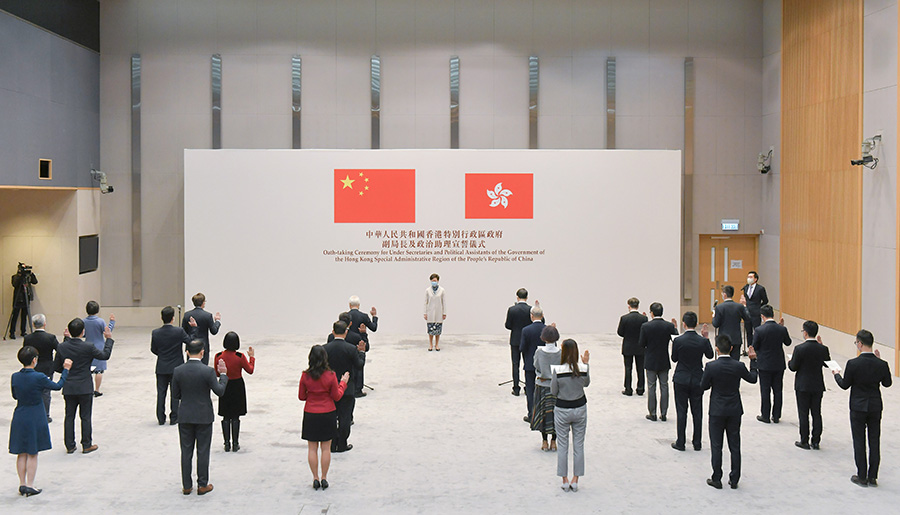Declaration of allegiance adds accountability to civil service system
China Daily Asia | Updated: 2020-12-24 10:11

The civil service in Hong Kong has undergone an important change this month with the requirement for all civil servants to take a legally-binding oath and/or sign a written declaration pledging allegiance to the Hong Kong Special Administrative Region (HKSAR) of the People's Republic of China in addition to upholding the Basic Law of the HKSAR. Civil servants joining the administration after July this year have all signed a declaration, whereas senior public officers swore an oath of allegiance a few days ago. All new recruits hereafter will be required to sign a standard declaration upon joining the civil service. The addition of such requirement further clarifies the role of civil servants in the SAR governing system, which is a significant step forward in preventing separatist elements from harming the public interest while on the government payroll.
Some believe that the relationship between civil servants and the government is comparable to an employee and an enterprise, where the former should, besides being loyal to, not act against the latter party. This comparison, however, is not completely accurate. Normally the relationship between corporate employees and employers is all about "personal interest" and employees would not harm their employers' interest intentionally. That said, the two parties are still legally bound by employment contracts to ensure their separate interests. Civil servants, by definition, serve the public and are therefore not directly tied to the government by personal interest. Besides, civil service jobs are relatively "rigid", meaning the government cannot fire its employees easily. This employment relationship makes it easier for the government to secure long-term loyalty of civil servants but has been lacking in maintaining civil servant accountability. That is where the "oath of allegiance" comes in to plug the loophole.
The next step for the SAR government is to reinforce the understanding of the code of conduct among civil servants
The declaration goes like this: "I declare that, being appointed as a civil servant of the Government of the Hong Kong Special Administrative Region of the People's Republic of China, I will uphold the Basic Law of the Hong Kong Special Administrative Region of the People's Republic of China, bear allegiance to the Hong Kong Special Administrative Region of the People's Republic of China, be dedicated to my duties and be responsible to the Government of the Hong Kong Special Administrative Region."
The content, which is derived from common sense and nothing new, is not liable for any disputes. What needs to be emphasized instead is the action of taking the oath. The "Civil Servant Code" promulgated in 2009 specifies the code of conduct for all civil servants, who must abide by the Basic Law and dedicate themselves to the incumbent Chief Executive and SAR government as well as supporting government policies and decisions. However, the enforceability of the Code has been called into question when some if not many civil servants joined street riots and were even arrested for illegal assembly last year.
Oath taking by civil servants is a political response to a real challenge in Hong Kong. When the anti-extradition law movement broke out last year, a large number of civil servants took part in high profile assemblies, during which they declared their opposition to the government with clear political bias. By doing so they sent a wrong message to the public that civil servants could openly rebel against the government. Thus, pledging allegiance would, according to the Civil Service Bureau, "enhance civil servants" awareness of the expectations and responsibilities brought on them by their official positions.
The allegiance and political neutrality of civil servants are of paramount importance as they contribute to the establishment of a political system. Imagine if a civil servant is allowed to rebel against a certain government policy out of his "righteous" belief, there is a real possibility they would do the same against any other policy of their choosing. Principal officials are held accountable by law for the decisions and statements they make on behalf of the government. Average civil servants, for many years, were not held accountable by law for the political decisions they made, even when those decisions adversely affected public interest. Therefore, the purpose of oath taking or written declaration is to add "accountability" to the law of "political neutrality" and "allegiance". Secretary for the Civil Service Patrick Nip Tak-kuen stated earlier that if a working civil servant refused to sign the declaration, he would consider invoking the Public Service (Administration) Order 1997 and ask the concerned person to resign.
The new requirement is laid down now because some moral norms observed in the past were broken by political upheavals such as the "black revolution" last year. Those norms, including civil servants' allegiance to the HKSAR of the PRC and political neutrality, are crucial to maintaining stability and prosperity in Hong Kong. When those norms are broken it is a matter of course for the SAR government as well as the central authorities to set things straight with clear and precise policy responses. An exceptionally urgent example of such responses is the Law of the PRC on Safeguarding National Security in the HKSAR, or the National Security Law for Hong Kong in short.
With the oath taking and declaration of allegiance put in place, the next step for the SAR government is to reinforce the understanding of the code of conduct among civil servants. This will remind them to abide by the rules and clear up any misunderstanding the public might have regarding civil servants' code of conduct.
The author is senior research officer of the One Country Two Systems Research Institute.
The views do not necessarily reflect those of China Daily.
























